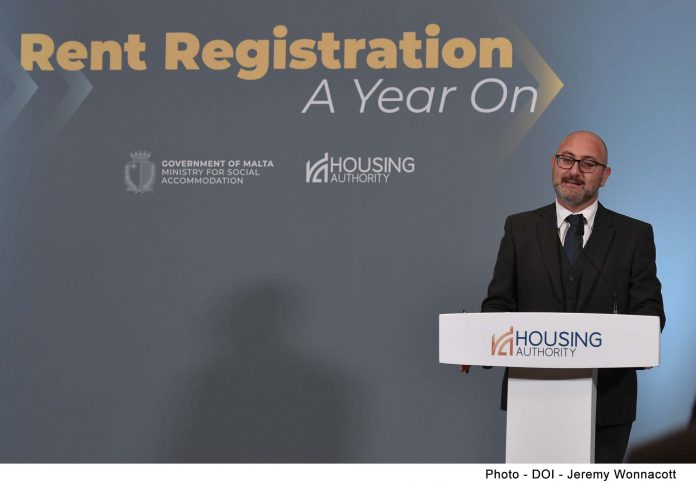
The Housing Authority recorded very positive results in its first year as regulator for the private rental market. As of the end of December 2020, more than 30,000 private residential leases had been registered.
This regulatory role was placed upon the Authority following a white paper process concerning the private rental market which commenced in 2018. At the time, the white paper proposed a regulatory framework for these private residential leases. These proposals were formulated because of an ample consultation exercise conducted with all relevant stakeholders, with said suggestions being subsequently incorporated in the bill promulgated by the Maltese House of Representatives in 2019.
Minister for Social Accommodation Roderick Galdes reiterated that, “What we promised landlords and families living in rental accommodation three years ago, has now come to fruition. Through this reform in a market of paramount importance, we are guaranteeing transparency, stability, and security. With this year not being an easy one, it certified more than ever the importance of a mandatory registration procedure for private leases which offers reassurance to both parties. This year was proof that the three promises we made were not futile.”
The minister added that the success of this reform is due to a long consultation process. “This process was fundamental for this reform to start on a positive note and be enjoyed by both landlords and families in rental accommodation. For the first time, the State has the data to prove our claims of efficient and effective reform. This data shall be crucial in making informed decisions based on real facts to further improve this sector. The aim of the reforms we are pursuing in the housing sector is not solely to leave them as buzzwords on paper but to implement and pursue them so that we can continue expanding on these concrete achievements.”
CEO of the Housing Authority Leonid McKay presented the first-ever statistics on the private residential leases market gathered and analysed by the government. “By the end of December, 30,483 contracts have been registered with the Housing Authority. 70% of these private residential lease agreements have been agreed upon for one year. Today, through mandatory registration, we also have, for the first time, information on the number of properties that are being rented for residential purposes and in which locations they are located. It turned out that the majority of these properties are located in St Paul’s Bay, Sliema, Msida, St Julian’s, and Gżira”.
Mr McKay explained that in May the Housing Authority also set up a dispute resolution panel that is expeditiously resolving small issues regarding payments and maintenance that do not amount to more than €5,000.
“Through this panel, we are strengthening relations, between landlords and tenants, which previously did not have an expeditious and effective remedy in case one or the other fails to honour its obligations. By the end of the year, 94 cases have been submitted, most of which were decided within five days of the parties providing the necessary documents. The majority of cases concerned electricity and water issues as well as deposit issues. The cases decided by the end of the year favoured the owners.”
He concluded that the Authority was pleased to be of service to the landlords and tenants who approached it. The new section within the Housing Authority that was set up for this purpose answered more than 28,000 phone calls.
The next step is to publish The 2020 Malta Residential Study, which will be a detailed report that will give a clearer and more detailed picture of the private rental market in Malta. The observatory is composed by economist Dr Marie Briguglio and the Central Bank of Malta.
Dr Marie Briguglio said, “It is good to remember that the rental market is a complex market because, in addition to serving the investor (landlord) and the consumer (tenant), it is also widely connected with areas of social justice, and welfare in the country. The fact that the Housing Authority has requested that an impact study be carried out from the first year after the introduction of the law augurs well for the future of this law as it shows capacity and willingness for a policy that looks at the evidence and examines both the positive and negative impacts it may have.”
Economist within the Central Bank of Malta, Dr Brian Micallef, said, “The study will include an analytical analysis on the information gathered after one year from the establishment of the register of leases maintained by the Housing Authority. In addition to providing more detail on the rental market in our country, this study will open up new research opportunities, both of an economic and social nature, which is difficult to do with the existing data we have to date.”









